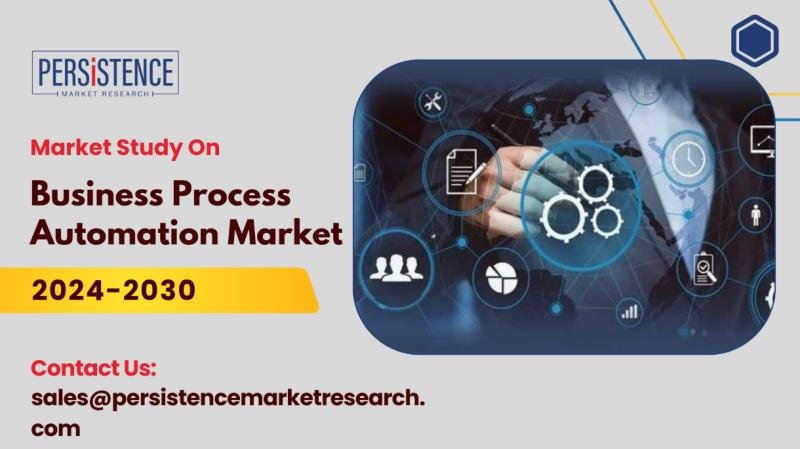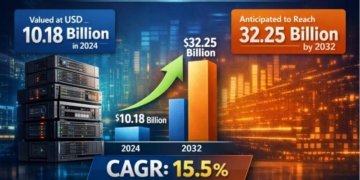The global business process automation (BPA) market is expected to grow at a CAGR of 11.4% between 2024 and 2030, expanding from US$14.2 billion in 2024 to US$30.2 billion by 2030. BPA enhances efficiency by reducing human intervention in complex business tasks, utilizing integration tools and software applications. This trend is driven by the need for operational efficiency, the growing complexity of business operations, and the shift toward digital transformation. Organizations adopting BPA can minimize errors, accelerate processes, and reduce costs, making it a key factor for competitiveness and long-term growth.
Request for Sample: https://www.persistencemarketresearch.com/samples/33620
Rising Demand for Automation in Business Processes
The primary driver of business process automation adoption is the growing demand for operational efficiency across industries. Companies are seeking ways to streamline their internal processes, reduce human error, and cut costs, making BPA an essential part of modern business strategies.
In sectors such as manufacturing, retail, finance, and healthcare, BPA is helping organizations automate repetitive and time-consuming tasks such as data entry, order processing, invoicing, and customer service. As a result, companies can focus on more strategic activities, which leads to increased productivity and improved customer satisfaction. Moreover, automation technologies like robotic processs automation (RPA) are further enhancing the capabilities of BPA systems, making them more intelligent and adaptable.
Role of AI and Machine Learning in BPA
Artificial intelligence (AI) and machine learning (ML) are becoming integral to business process automation, enabling companies to not only automate routine tasks but also analyze and optimize processes in real time. AI-powered BPA solutions can learn from past data, make predictions, and continuously improve over time.
For instance, in customer service, AI-driven chatbots and virtual assistants can handle routine inquiries, while machine learning algorithms can analyze patterns in customer behavior to offer personalized solutions. This integration of AI and ML into BPA systems is expected to drive further growth in the market, as companies look for smarter and more adaptive automation solutions.
Integration with Cloud Technologies Fuels Growth
The integration of BPA with cloud technologies is another significant factor contributing to market growth. Cloud-based BPA solutions offer flexibility, scalability, and cost-effectiveness, making them accessible to businesses of all sizes.
By leveraging cloud infrastructure, organizations can deploy automation systems quickly without the need for extensive on-premise installations or hardware investments. Cloud-based platforms also enable businesses to manage their processes remotely, providing real-time visibility and control over operations. This convenience has led to widespread adoption, particularly among small and medium-sized enterprises (SMEs) that may not have the resources to invest in traditional automation systems.
SMEs’ Growing Adoption of BPA
Small and medium-sized enterprises are increasingly recognizing the value of business process automation in improving operational efficiency and competitiveness. Historically, automation technologies were mainly adopted by large corporations with extensive resources. However, with the rise of affordable and cloud-based solutions, SMEs are now able to implement BPA systems without the need for significant capital investments.
For SMEs, automation can lead to significant cost savings by reducing the need for manual labor and minimizing errors in routine tasks. Moreover, BPA allows small businesses to scale their operations efficiently and focus on core business activities, which is crucial in a highly competitive market environment. The growing adoption of BPA by SMEs is expected to be a key driver of market growth in the coming years.
Key Industry Sectors Embracing BPA
Several key industry sectors have emerged as early adopters of business process automation due to the nature of their operations and the need for high efficiency. These sectors include:
• Manufacturing: In manufacturing, BPA is used to streamline supply chain management, inventory tracking, and production processes. Automation ensures that operations run smoothly, with minimal downtime and reduced human error.
• Financial Services: Financial institutions use BPA to automate processes such as loan approvals, fraud detection, and compliance management. This not only reduces processing times but also improves accuracy and regulatory compliance.
• Healthcare: In the healthcare sector, BPA is used to manage patient data, billing, and appointment scheduling. Automation in healthcare improves operational efficiency, reduces administrative overheads, and enhances patient care by allowing healthcare professionals to focus more on patient needs.
• Retail: Retailers are leveraging BPA to improve customer experience through automated inventory management, order processing, and personalized marketing campaigns. BPA allows for better resource allocation and enhances customer satisfaction by speeding up service delivery.
Challenges in Business Process Automation Implementation
Despite the numerous benefits, businesses face several challenges when implementing business process automation. One of the primary challenges is resistance to change within organizations. Employees may be reluctant to adopt new technologies, fearing job displacement or feeling uncomfortable with new systems. To address this, companies must invest in training and change management programs to ease the transition and demonstrate the value of automation.
Another challenge is the initial cost of implementing BPA systems, especially for smaller businesses. While cloud-based solutions have made BPA more accessible, the upfront costs for customization, integration with existing systems, and employee training can still be prohibitive for some organizations.
Data security and privacy concerns also pose a challenge for companies looking to automate their processes. As more business operations move to digital platforms, the risk of cyber-attacks increases, making it crucial for organizations to invest in robust security measures and ensure compliance with data protection regulations.
Regional Insights: North America Leads the Market
Geographically, North America is expected to hold the largest share of the business process automation market during the forecast period. This dominance can be attributed to the region’s advanced technological infrastructure, high adoption rates of cloud-based solutions, and strong presence of key market players. The United States, in particular, is a major hub for innovation in automation technologies, with companies across various sectors embracing BPA to remain competitive.
Europe is also a significant market for business process automation, driven by increasing investments in digital transformation initiatives. Countries such as Germany, the United Kingdom, and France are at the forefront of adopting automation technologies to enhance operational efficiency and reduce costs.
Meanwhile, the Asia-Pacific region is expected to witness the fastest growth in the BPA market over the next few years. Rapid economic development, the rise of the digital economy, and increasing adoption of automation solutions by businesses in countries like China, India, and Japan are fueling this growth. SMEs in this region are also increasingly adopting cloud-based BPA solutions to streamline their operations and compete on a global scale.
Future Trends in Business Process Automation
As the business process automation market continues to evolve, several key trends are expected to shape its future. One such trend is the growing adoption of hyperautomation, which combines advanced technologies like AI, ML, RPA, and process mining to automate more complex tasks and workflows. Hyperautomation allows organizations to achieve end-to-end automation across their operations, leading to greater efficiency and cost savings.
Another trend is the increasing use of low-code and no-code platforms, which enable non-technical users to create and customize automation workflows without the need for extensive programming knowledge. These platforms are democratizing automation by allowing employees from various departments to implement automation solutions tailored to their specific needs.
Read More: https://www.persistencemarketresearch.com/market-research/business-process-automation-market.asp
Conclusion: A Transformative Market on the Rise
The business process automation market is poised for significant growth, driven by the increasing need for operational efficiency, advancements in AI and cloud technologies, and the growing adoption by SMEs. With a projected CAGR of 11.4% by 2030, the BPA market is set to transform industries across the globe, offering businesses the tools they need to stay competitive in an increasingly digital world. As companies continue to embrace automation, those that can effectively implement and integrate BPA solutions will be well-positioned for success in the future.
Contact Us:
Persistence Market Research
G04 Golden Mile House, Clayponds Lane
Brentford, London, TW8 0GU UK
USA Phone: +1 646-878-6329
UK Phone: +44 203-837-5656
Email: sales@persistencemarketresearch.com
Web: https://www.persistencemarketresearch.com
About Persistence Market Research:
At Persistence Market Research, we specialize in creating research studies that serve as strategic tools for driving business growth. Established as a proprietary firm in 2012, we have evolved into a registered company in England and Wales in 2023 under the name Persistence Research & Consultancy Services Ltd. With a solid foundation, we have completed over 3600 custom and syndicate market research projects, and delivered more than 2700 projects for other leading market research companies’ clients.
Our approach combines traditional market research methods with modern tools to offer comprehensive research solutions. With a decade of experience, we pride ourselves on deriving actionable insights from data to help businesses stay ahead of the competition. Our client base spans multinational corporations, leading consulting firms, investment funds, and government departments. A significant portion of our sales comes from repeat clients, a testament to the value and trust we’ve built over the years.
This release was published on openPR.
















